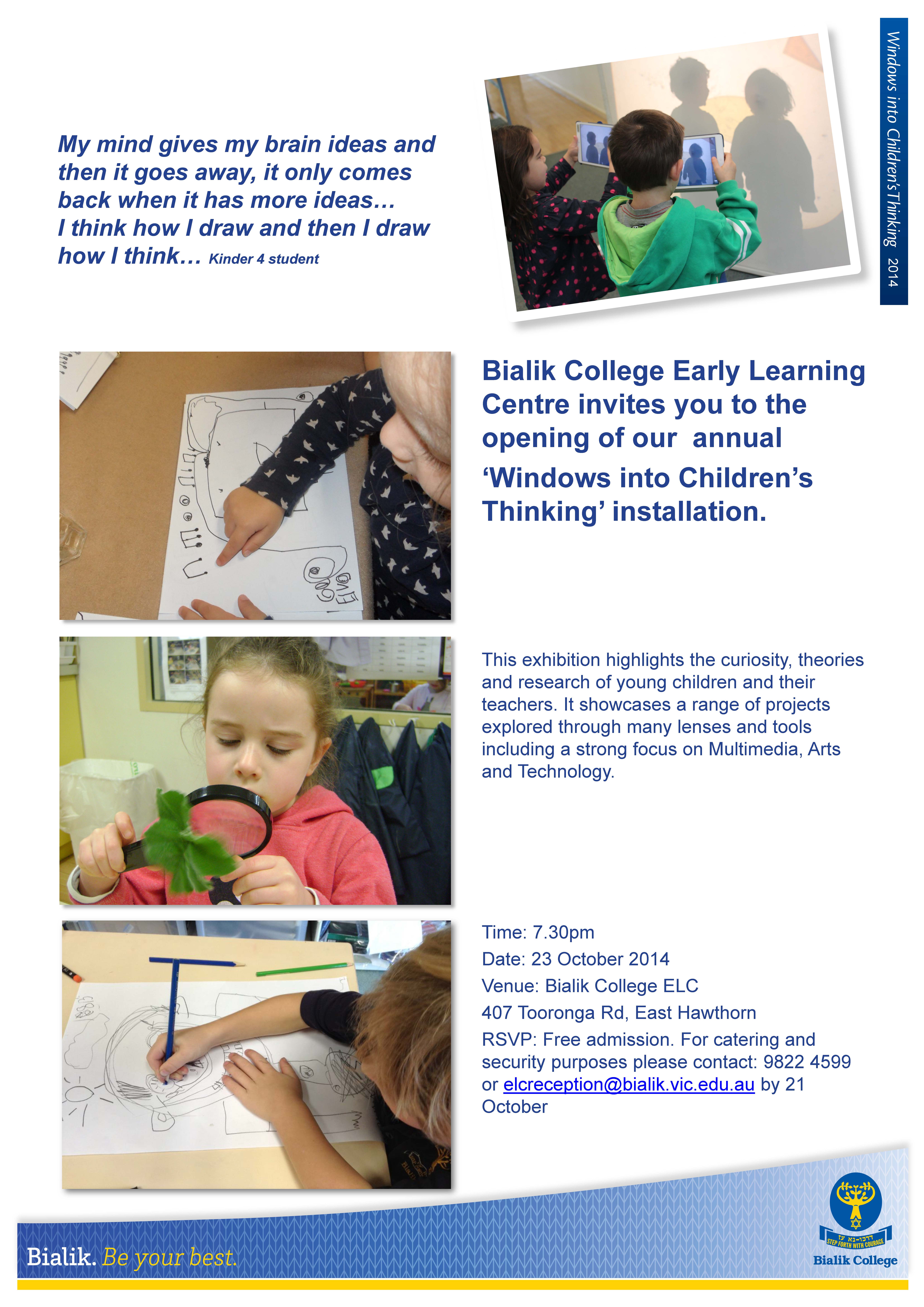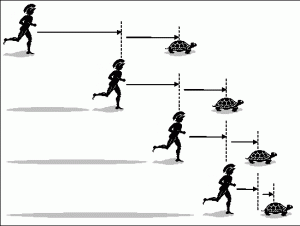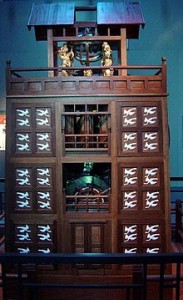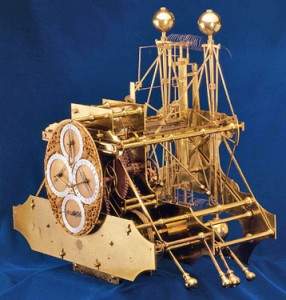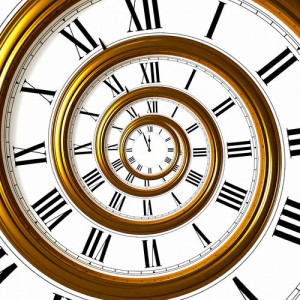Click on the links below to access the classes:
Author Archives: admin
Digital Component of the 2014 Exhibition
Windows into Children’s Thinking 2014 Installation
The videos are now live….
How to access the digital content.
Click here to see all of the ebooks from the various classes. You can also click on the tab above and go to the individual classes to see the videos.
Feedback from opening night….
Dear All,
What a fabulous night!! You all did an amazing job!! I listened to some parent comments…
‘Wow! This is a lot of work!’
Some just loved seeing their children in a photo or their comment ‘up in lights’ so to speak.
Personally I read quite a few panels and really loved seeing the children’s thoughts on so many different theories and ideas. The iPads also brought the panels to life.
Well done to all the staff!!
You are all unique and amazing!!
Sarah
Dear ELC staff,
The evening, and the exhibition, was (and is) fantastic. A real celebration, explanation and exemplification of strong, purposeful and investigative learning.
I was bowled over by the quality of the documentation and inspired by the in-depth conversations the children are having about complex subjects.
Well done to all – huge effort has gone into this and all are to be congratulated.
Jeremy
We welcome you to join us…
Timely Thoughts: Reflections on Time by Jeremy Stowe-Lindner
Friends and colleagues,
Time interests me. I like clocks. I like their look, their serenity. I am interested in their inevitability and their rules. I like their international language.
I am a history teacher and a philosophy teacher – so it fits that the need for measuring time, the presentation of time, and questions surrounding time, intrigue me. And so it is that Time, History and Memory are the topics of our conversation today.
I would like you to engage in a fantasy with me for a moment. I would like to look at a paradox, something that should make sense, but doesn’t. Something that in isolation works, but when we put it with what else we know, doesn’t.
The Greek philosopher Zeno imagines that the God Achilles, who was known for his speed – Achilles’ heal and all that – had a race with a tortoise – beautiful animals but not exactly known for their speed. Achilles gives the tortoise a headstart – let us say 100 metres.
If we suppose that each racer starts running at a constant speed – one very fast and one very slow, we would say that Achilles will over take the tortoise. But Zeno’s paradox says that he doesn’t.
Zeno says this. If the two of them race, with the tortoise having a headstart, – then after some finite time, Achilles will have run 100 metres, bringing him to the tortoise’s starting point. During this time, the tortoise has run a much shorter distance, say, 10 metres. It will then take Achilles some further time to run that distance, by which time the tortoise will have advanced farther; and then more time still to reach this third point, while the tortoise moves ahead.
If we follow the logic, then whenever Achilles reaches somewhere the tortoise has been – the dotted line in the picture here – he still has farther to go. Therefore, because there are an infinite number of points Achilles must reach where the tortoise has already been, he can never overtake the tortoise.
Zeno was a Greek philosopher who enjoyed suggesting paradoxes which challenge our understanding of the normal. We know that in reality Achilles would overtake the tortoise, but when explained in this way, there is a philosophical block to speed winning a race.
Today I would like to speak with you about one of the themes of this paradox. Time. Time in general, and history in particular. We will look at the traditional concept of time and compare it to that in the Jewish tradition. I would like to ask as many questions as I answer today, honouring the philosophy of Reggio Emilia that we are celebrating this evening. Asking the right questions and engaging in the explorations of learning are in themselves goals to make us powerful learners and collaborative members of society.
Time is an artificial construct. It governs our lives, we live by the clock, we try and act in a timely way, we speed up, and we slow down. Schools in particular live by the bell. Our lessons last the same amount of time. Meetings fit within lesson times. Toilet visits are governed by time. When we eat is governed by the bell. And in society as a whole, how often do we say, I need time to think, give me some more time, I’ll be there in a minute. Let us try and understand this concept of time, and where it came from.
Let us start with clocks. Let us start with some audience participation, to warm us up. When, I ask you, was the first time-measuring clock invented?
1587 BC 1277AD 1487AD 1787AD
Well they’re all right. Water clocks were probably the earliest form of clocks – we know that there were some in Ancient Babylon and Egypt in the 16c BCE – here’s a replica of Su Song‘s Astronomical Clock Tower, built in 11th century Kaifeng, China. It was driven by a large waterwheel.
Muslim Spain had the first mechanical clocks that we might recognise – they were certainly around in the 13thc and possibly before. The word clock, by the way, comes from the Celtic words clocca and clogan, both meaning “bell” – most likely it was the sound of bells which also characterized the prototype mechanical clocks that appeared at this time. They didn’t tell time in the way that we might recognise – they were basically reminders for particular events, or prayer services.
Spring driver clocks emerged in the 15th century. Pendulum clocks came soon after and once Britain wanted to explore the high seas, the British government offered a £20,000 reward for a non-pendulum clock that would lose less than 10 seconds a day so that ships could navigate accurately. John Harrison won with this. Not really something that you’d wear on your wrist.
So why this obsession with time? Why this obsession with clocks.
Well, I think we now agree on a few things. Time is an artificial construct – we have developed systems over time to measure it, categorise it, and understand it.
We saw from Zeno’s paradox that there is a difficulty with matching up the laws of time, with the laws of motion. We also know that the faster you travel, even though time flows at a constant rate for the traveller, time objectively slows down. This is part of Einstein’s theory of relativity. It is also, he said, how it is possible to time travel. How do we know this to be true? Well, place two atomic clocks on two aircraft, one flying westward and one flying eastward, and you will see that time passes slower on the eastward heading aircraft, since it is moving with the earth’s rotation and thus a bit quicker. So time is not something that is constant. When the two aircraft land at the same point, their two clocks show different times.
We have established that time can be different for different people, and that our method of measuring it – 24 hours a day, 7 days a week, 60 seconds in a minute and so on – is an artificial construct. The French Revolution, after all, experimented with a 10 day week. Between 1582 and 1752, two different calendars were used in Europe. In England, only by an Act of Parliament in 1752 did they move over to one calendar, wiping out 11 days of September in one go.
Let us now move onto the practical implications of time and history here at school.
I am a history teacher. The way we like to look at time in History lessons is using a timeline. In the History classroom, we see time as linear. There is a straight line between now, yesterday, last year, last century, last millenium.
This makes time easy to categorise, to list, to understand. A sense of linear chronology is a basic skill in the Australian History curriculum and is listed as a teachable skill from the Foundation year, or Prep.
We gain an understanding of time as our brains develop. Using my own children before the age of schooling as an example, we can see this.
At this age Jesse had an understanding only of the present. He had no concept of past or future.
At this age he had an understanding of now, before and soon.
At this age he had an understanding of memory, yesterday, present, tomorrow and the future.
I wonder what life would be if we developed no understanding of chronology.
I would like us now to consider the Jewish understanding of time. Because this is the important aspect of this talk. In what ways does the Jewish understanding of time shift away from the traditional.
Here’s a Hebrew test. What is the Hebrew word for History? Well the answer is that there is none. The Hebrew word for History is borrowed from the English: Historia. That is because there is no concept of history in Jewish tradition in the way that we recognise it. The books of the bible play around with time – the early humans lived for centuries, the events are often muddled up with no traditional sense of chronology. People appear from all over the place. Adam the first man was still alive when Noah’s father – Noah of the Flood – was alive. The patriarch Abraham was 75 years old when his 205 year old father Terah died! In Bereishit, genesis, the world itself was created twice – read the first two chapters.
SO, if there is no word for history, what is the concept of history in Jewish tradition. How do we view time, and in what way is it different to our current understanding of it. If modern tradition, with clocks and so on, view time as linear, then Jewish tradition does not.
In the absence of Historia, there is Zichron, which means remembrance. We remember things – events are not in history – they are in our history. The other name for our new year, Rosh Hashanah, is Yom HaZikaron – the day of remembrance – and it is a two day festival, even though we use the word Yom – which means Day in the singular. Rosh Hashana is translated in English as New Year – but we also call Rosh hashana the birthday of the world, but actually it is the remembrance of creation of the world.
During our blessing over wine on Friday nights, we remember the days of slavery in Egypt. And on Passover, Pesach, we say that we remember the days of slavery, and we are commanded to behave ‘as if you yourself were there.’
How can we do this? How can we remember the days of creation? How can we be as if we were slaves in Egypt. How can we remember History, rather than learn it.
The Jewish people have been through a lot – and the scars of events are often quite literally born on the forearms of our grandparents. Yair lapid, Israeli politician said, “there is not one family in all of Israel whose members sit at the table and say ‘oh well not much happened to our family in the last 300 years’.
Do we remember, rather than learn about, the events because they are painful? Exile, dispersion, pogroms, persecution, murder and war? Partly. Do we remember because of the wonderful events? The barmitzvas, the independence days, the parting of the seas, the successes, the achievements of our Einsteins and our Mendlessons? Partly.
We also remember the events because we have a different way of looking at time.
If the traditional view of time is by watching the clock and cataloguing time in a linear way, the Jewish way of viewing time is a spiral.
What if our clocks looked like this? The Jewish view of time does not hark back along a timeline to the distant past. It sees spirals and circles, not lines. It peers back into history, as though yourself were there says the Passover Haggada. We do not look back – we look down to the spirals beneath us and we do not just learn about, we remember.
We thrive in Zeno’s paradox because we use different rules of times. We create rituals to recreate the stories of yesteryear because we are commanded not to learn – but to remember. It is the memory of our history that helps us to celebrate, to laugh, to cry and to despair together. It is the memory of our history that helps unite members of our faith across the world.
Kol Yisrael Areivim ze la ze – all of Israel is responsible for each other – why? Because we were all there at the exodus from Egypt. We were all there at Mount Sinai. We were all there at the great dispersions. And we are all here, now, in celebration of history, in defiance of history, living history because zichron, and not Historia, is the basis of our heritage.
The iconic Jewish prayer, Shema, is written in the present tense, as if we are hearing the words of Moses. It tells us to remember the commandments. It is not about learning about- it is about remembering.
So, friends, how do we reconcile this? How do we reconcile the academic linear view of History with the Jewish concept of memory and remembrance.
I would suggest that we do not need to. They coexist, they do not conflict.
Memory is experiential and history is studied. We need both. The Jewish lens of history, of remembrance, thrives on historical proof but because it invokes memory as well, it is inherently popular. It levels the playing field because we are not reliant on history being taught to us. We are required and obligated to remember it. To sit down with bubba and zeida, with grandma and grandpa and find out about the past. What Jewish school does not have a family history project as part of its curriculum? With Jewish festivals, we relive the events. The Chanuka story we relive it. The Passover story we sit down and eat the food, tell the stories, and remind ourselves that we, ourselves, our very beings were freed from Egypt. And we continue the story is HiStory by telling it to our children. What do Jewish communities do as soon as they arrive somewhere to live? They build a school. We bring together objective history, documented history, factual history, with family and collective memory. We create living history.
Tonight is a celebration of the Reggio-eEmilia inspired philosophy of learning at Bialik College’s Early Learning Centre. Great schools unite thinking and learning with happiness, wellbeing, relationships and creativity. I hope that we have done something tonight to unite these principles into the minds of everyone here.
We all have our own narratives – and I hope what we have also shared tonight is that each of our narratives, each of our histories are different – and that is fine. We celebrate the diversity of our individual and collective memories and, standing on the shoulders of giants, our ancestors in memory and history, we step forth with courage – the Bialik College motto – Dirchuna Oz.
Exhibition Opening
We are delighted to have Jeremy Stowe-Lindner as our guest speaker for the opening of the exhibition on Wednesday 31 October.
 Jeremy Stowe-Lindner is Bialik College’s new Principal. His previous roles include the founding Head teacher of JCoSS, the Jewish Community Secondary School. Jeremy has held leadership positions in three London schools. Jeremy has an MBA in educational management, a Cert.Ed. in subject leadership, the NPQH (National Professional Qualification for Headship) and has also published both in the UK and abroad.
Jeremy Stowe-Lindner is Bialik College’s new Principal. His previous roles include the founding Head teacher of JCoSS, the Jewish Community Secondary School. Jeremy has held leadership positions in three London schools. Jeremy has an MBA in educational management, a Cert.Ed. in subject leadership, the NPQH (National Professional Qualification for Headship) and has also published both in the UK and abroad.
Describing himself as ‘a history and philosophy teacher by training and temperament’, Jeremy will speak on the theme of: Timely Thoughts: Reflections on Time.

